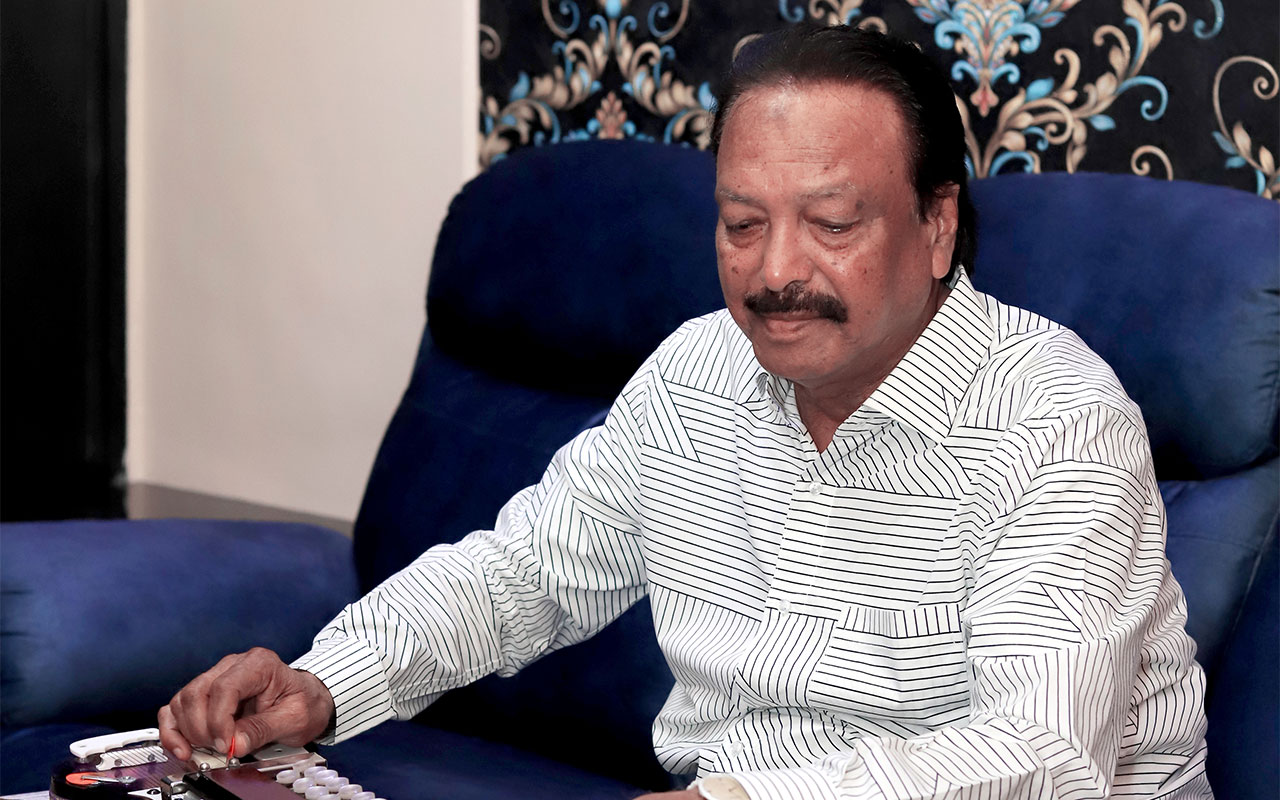Rashid Khan : The original ‘Banjo Man’
 In the comics arena as well as movie world there exists fictional characters viz. Super Man, Spider Man etc. But in the Indian film music industry exists an original ‘#BanjoMan’, #RashidKhan. He is a musician and extremely talented when it comes to playing a musical instrument Banjo. In the musical arena there has been a lot of musical instruments with whom many are familiar with. #Harmonium, #Tabla, #Sitar, #Flute etc are well known, but #Banjo is not or should we say, was not. Frankly a lot of people were unaware of Banjo, the instrument also known as ‘#BulBulTarang’ and even people from the film industry fall into that category. But one man, like a lone crusader, persisted with the sounds that emanates from Banjo and made it popular. Mr Rashid Khan made this musical instrument popular among the common people as well as musicians and composers. When he plays Banjo, a magic is created. He has been part of the film music industry for more than 45 years and even at the age of 76 he plays Banjo with the same passion. Rashid Khan interacted with our Sr Editor Keerti Kadam at his plush residence at Lokhandwala, Mumbai. Excerpts…
In the comics arena as well as movie world there exists fictional characters viz. Super Man, Spider Man etc. But in the Indian film music industry exists an original ‘#BanjoMan’, #RashidKhan. He is a musician and extremely talented when it comes to playing a musical instrument Banjo. In the musical arena there has been a lot of musical instruments with whom many are familiar with. #Harmonium, #Tabla, #Sitar, #Flute etc are well known, but #Banjo is not or should we say, was not. Frankly a lot of people were unaware of Banjo, the instrument also known as ‘#BulBulTarang’ and even people from the film industry fall into that category. But one man, like a lone crusader, persisted with the sounds that emanates from Banjo and made it popular. Mr Rashid Khan made this musical instrument popular among the common people as well as musicians and composers. When he plays Banjo, a magic is created. He has been part of the film music industry for more than 45 years and even at the age of 76 he plays Banjo with the same passion. Rashid Khan interacted with our Sr Editor Keerti Kadam at his plush residence at Lokhandwala, Mumbai. Excerpts…
How your musician’s journey commenced?
In younger days I used to sing. I used to be part of a lot of stage performances and I normally would sing Mohd Rafi’s songs. His songs were dear to me and I was a decent singer. Then I was invited to join a Qawwali party and I started as a chorus singer. These Qawwali programmes used to run till the wee hours in the mornings. While I was part of chorus group, someone important suggested my brother that he ask me to learn a musical instrument. Those days Banjo was in demand, so I decided to give it a try. I learnt playing Banjo and fell in love with the instrument and the sounds it created.
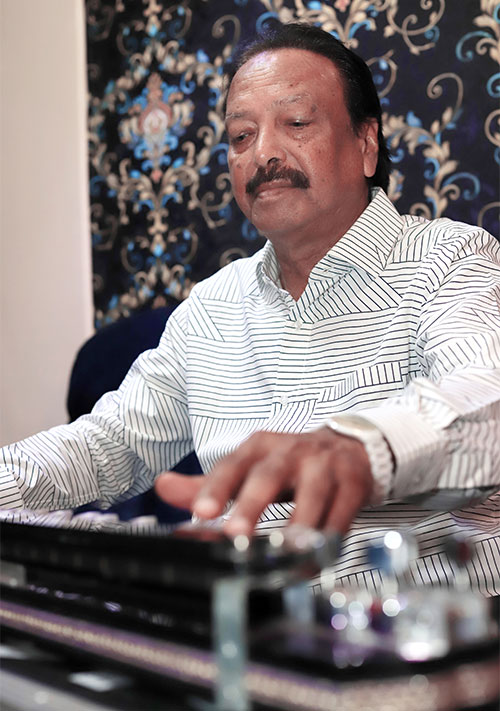 I was mastering the instrument as the days passed by and I started accompanying Qawwali parties. Those days there were 3-4 good qawwals in demand. Shankar Shambhu, Aziz Nazan, Yusuf Azad and Jani Babu. Jani Babu was known as the king of qawwals. I joined him as a Banjo player. It was fun playing Banjo with him as the jugalbandi or sorts used to take place which used to extract the best in ourselves, all the time. We used to get invited for functions. There was a function at music composer Laxmikant’s (from Laxmikant Pyarelal duo) place. They were celebrating actress Bindu’s birthday. We went to Laxmikant’s place and all of us, including me, played a better music which was appreciated by the guests. Hence the host Laxmikant was highly impressed with our programme. He said, “You all play so well. Will you come for a recording if I call you? ‘I was flabbergasted. I jumped at that opportunity. Laxmikant Pyarelal were recording a qawwali for Manmohan Desai’s Amar Akbar Anthony, which was filmed on Rishi Kapoor and Neetu Kapoor (then Singh). The qawwali is ‘Parda hai Parda, Parda….’. I played the piece and I think, I played it very well, because my Banjo piece was super hit. And the rest is history.
I was mastering the instrument as the days passed by and I started accompanying Qawwali parties. Those days there were 3-4 good qawwals in demand. Shankar Shambhu, Aziz Nazan, Yusuf Azad and Jani Babu. Jani Babu was known as the king of qawwals. I joined him as a Banjo player. It was fun playing Banjo with him as the jugalbandi or sorts used to take place which used to extract the best in ourselves, all the time. We used to get invited for functions. There was a function at music composer Laxmikant’s (from Laxmikant Pyarelal duo) place. They were celebrating actress Bindu’s birthday. We went to Laxmikant’s place and all of us, including me, played a better music which was appreciated by the guests. Hence the host Laxmikant was highly impressed with our programme. He said, “You all play so well. Will you come for a recording if I call you? ‘I was flabbergasted. I jumped at that opportunity. Laxmikant Pyarelal were recording a qawwali for Manmohan Desai’s Amar Akbar Anthony, which was filmed on Rishi Kapoor and Neetu Kapoor (then Singh). The qawwali is ‘Parda hai Parda, Parda….’. I played the piece and I think, I played it very well, because my Banjo piece was super hit. And the rest is history.
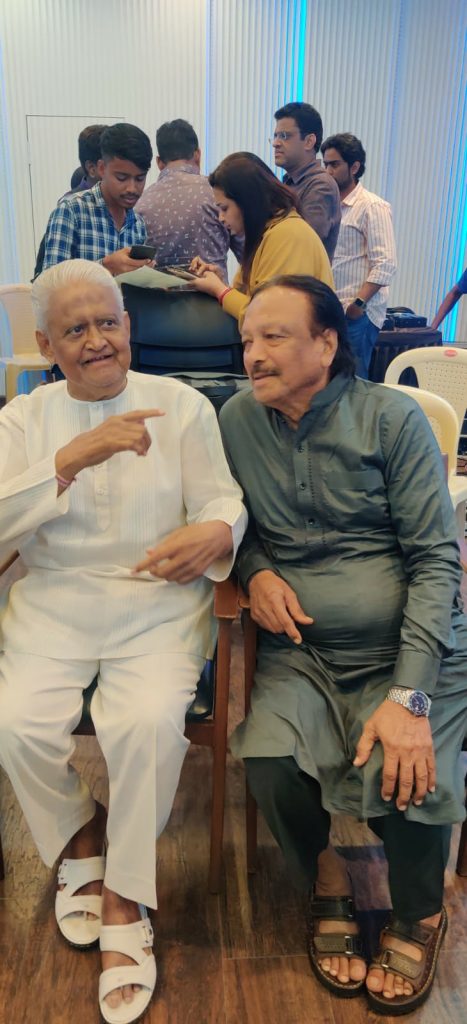 I played Banjo for many superhit songs. I became regular a musician for composers Laxmikant Pyarelal. I was part of all the songs they composed. Those days a lot of recordings used to take place at Famous Recording studio, Mahalaxmi. Later the scene shifted to Mehboob studios in Bandra. Mehboob’s recording studio was the state of art place, those days, plus it was huge with modern facilities. More than 200 musicians, at a time, could be accommodated in it. And most of the time it was booked by Laxmikant Pyarelal. Other composers used to wait for any cancellations. But we musicians were treated very nicely by LP . We used to get 30 dates of the month and about 15-16 recordings used to take place. Again almost all the music directors like R D Burman, Nadeem Shravan, Naushad to name a few, wanted us, i.e. LP’s musicians because all of them were top class, well trained and experts in their craft.
I played Banjo for many superhit songs. I became regular a musician for composers Laxmikant Pyarelal. I was part of all the songs they composed. Those days a lot of recordings used to take place at Famous Recording studio, Mahalaxmi. Later the scene shifted to Mehboob studios in Bandra. Mehboob’s recording studio was the state of art place, those days, plus it was huge with modern facilities. More than 200 musicians, at a time, could be accommodated in it. And most of the time it was booked by Laxmikant Pyarelal. Other composers used to wait for any cancellations. But we musicians were treated very nicely by LP . We used to get 30 dates of the month and about 15-16 recordings used to take place. Again almost all the music directors like R D Burman, Nadeem Shravan, Naushad to name a few, wanted us, i.e. LP’s musicians because all of them were top class, well trained and experts in their craft.
I feel that I was the chosen one. Because those days you had to be extra ordinary to get to play a solo piece in the song. I got that opportunity, many times. Tu Cheez Badi Hai Mast Mast (Mohra) which had Akshay Kumar and Raveena Tandon, Ek Do Teen…(Tezaab) with which Madhuri Dixit rose to stardom, title song Banjo piece in Karma which starred Dilip Kumar, Anil Kapoor, Naseeruddin Shah and Jackie Shroff. Those days I have witnessed the stardom of Dilip Kumar. No one used to sit in front of him when he was sitting in a room. Other stars used to fetch him tea etc. He commanded that kind of respect.
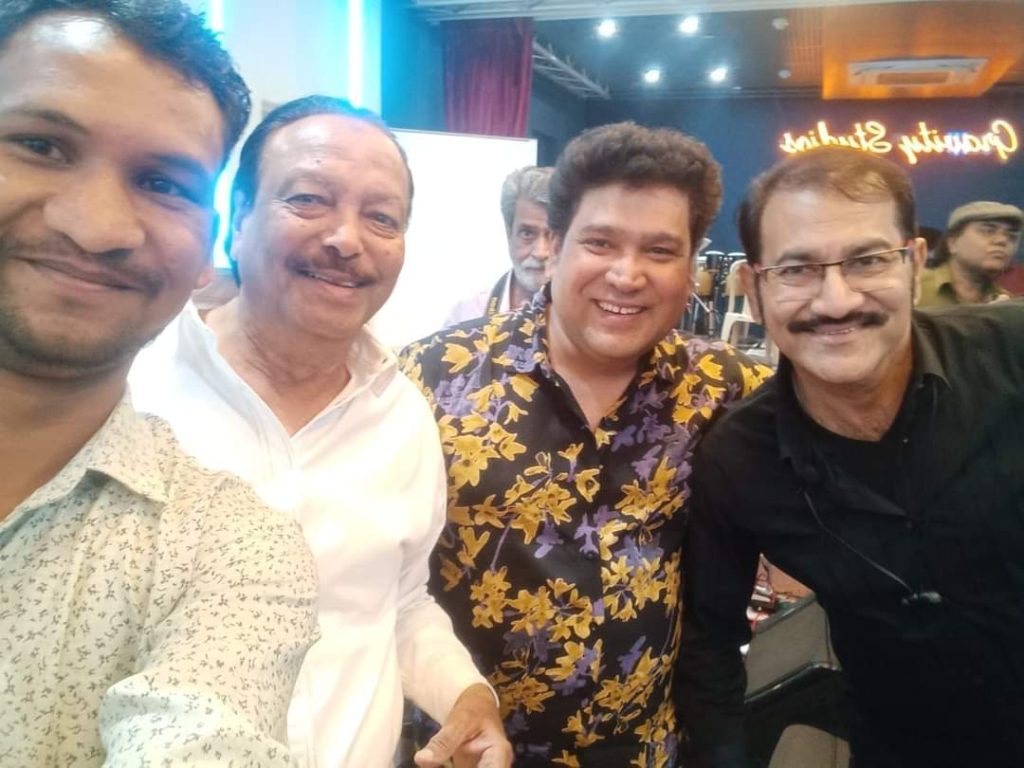 I have the privilege of working with almost each and every music director, old and new, except A R Rahman. It so happened that I was called to play Banjo for one of the A R Rahman’s compositions. For that I needed to travel to Chennai. But those days I had a lot of prior commitments here in Mumbai so I declined that offer. Moreover I think if he finds me worthy for his song, he can come down to Mumbai to record it. But I do not hold any grudges against anybody. I must tell you that a lot of people in the industry were saying, ‘Rashid bhai, In whichever song you play solo Banjo, it becomes super hit’. Of course this kind of appreciation boosts your morale to do better.
I have the privilege of working with almost each and every music director, old and new, except A R Rahman. It so happened that I was called to play Banjo for one of the A R Rahman’s compositions. For that I needed to travel to Chennai. But those days I had a lot of prior commitments here in Mumbai so I declined that offer. Moreover I think if he finds me worthy for his song, he can come down to Mumbai to record it. But I do not hold any grudges against anybody. I must tell you that a lot of people in the industry were saying, ‘Rashid bhai, In whichever song you play solo Banjo, it becomes super hit’. Of course this kind of appreciation boosts your morale to do better.
You were part of Laxmikant Pyarelal troupe. How was their treatment towards you?
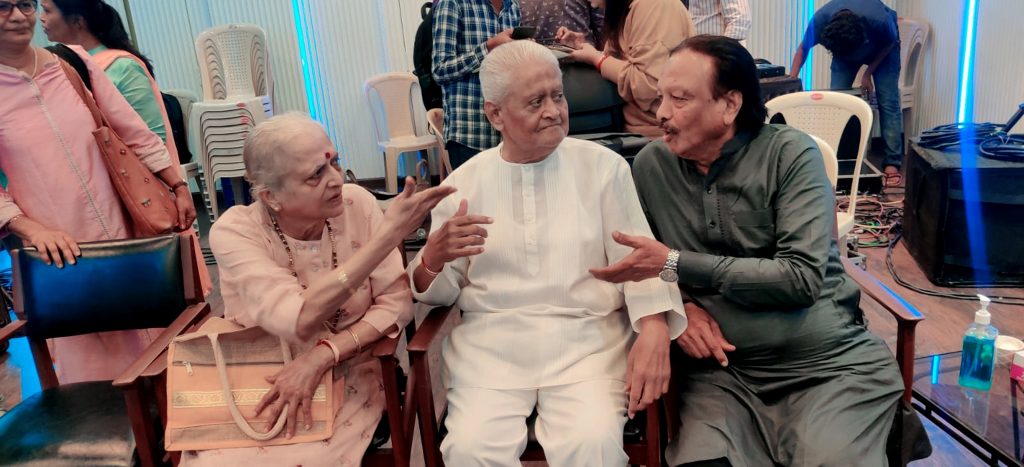 Excellent. They have been fabulous music composers and both of them were good souls. They were very good at heart and used to respect musicians-artists immensely. They believed in ‘Talking’ through their music. Because of the quality they brought forth, every famous film maker wanted to work with them. I can say, ‘Unhone Puri industry ko hila ke rakh diya tha’. Laxmikant Pyarelal were so busy music directors that they had employed 10-15 music composers. Shiv-Hari, Sonik Omi etc were on their payroll. They worked on many films with Subhash Ghai and delivered super hit music, each time. I want to request Subhash Ghai to do a show or make a documentary showing the way songs were recorded in that era because he has filmed all the song recordings. The amount of hard work went through making a single song will come to the fore because in today’s times everything is done on synthesiser.
Excellent. They have been fabulous music composers and both of them were good souls. They were very good at heart and used to respect musicians-artists immensely. They believed in ‘Talking’ through their music. Because of the quality they brought forth, every famous film maker wanted to work with them. I can say, ‘Unhone Puri industry ko hila ke rakh diya tha’. Laxmikant Pyarelal were so busy music directors that they had employed 10-15 music composers. Shiv-Hari, Sonik Omi etc were on their payroll. They worked on many films with Subhash Ghai and delivered super hit music, each time. I want to request Subhash Ghai to do a show or make a documentary showing the way songs were recorded in that era because he has filmed all the song recordings. The amount of hard work went through making a single song will come to the fore because in today’s times everything is done on synthesiser.
Laxmikant Pyarelal used to treat me as a family member. They have given me Banjo solo pieces because they were confident about my talent. I am grateful for that. They have always been excellent. They used to be like a Canon, where others would be like a sword or a knife or a revolver or any other small weapon. I am not deriding anybody’s talent but I have witnessed LP’s talent from close quarters. Again I am not saying this because I have a long association with them. I am still a part of LP troupe. Just a couple of months back we had gone on a musical tour to Canada and USA. The quality of music created by them is still intact. The fragrance emitted through their songs is mesmerising. I have witnessed the songs of 70s, 80s getting once mores. Likewise compositions of Kalyanji Anandji, S D Burman, Naushad and other olden era music director’s compositions are still relevant and despite generation gaps, they are preferred over new songs.
 Talking of new songs, I am astonished with a few facts that anybody is becoming a singer. Even a peanut vendor is a singer now. The new form of music is liked by youth but those singers lack the aura of yesteryear singers. I was shocked to know that one of the rappers is charging more than Lata Mangeshkar. It’s ironical but true. I am not jealous of that but it pains me that somebody without ‘sur & taal’ is so popular. He is made a star singer with a Song Hammering technique. But tell me which songs you remember which are 6-8 months old?
Talking of new songs, I am astonished with a few facts that anybody is becoming a singer. Even a peanut vendor is a singer now. The new form of music is liked by youth but those singers lack the aura of yesteryear singers. I was shocked to know that one of the rappers is charging more than Lata Mangeshkar. It’s ironical but true. I am not jealous of that but it pains me that somebody without ‘sur & taal’ is so popular. He is made a star singer with a Song Hammering technique. But tell me which songs you remember which are 6-8 months old?
I was talking about Lata Mangeshkar. What a lady and what a singer. She was India’s ‘Bulbul’. I remember one instance. I was in South Africa for some music festival. There I was interacting with Pakistani musicians. They were bragging about their country’s singers. ‘We have Ghulam Ali, Noorjehan, Mehdi Hasan, Nusrat Fateh Ali Khan etc. Does your country have so many talented singers?’ one asked. I replied, ‘If you want to add some more, go ahead. For you only one name is enough. That is Lata Mangeshkar, who is more talented than these singer’s talents put together’. Javed Akhtar saab recently said on the Pakistani soil, ‘We have always respected Pakistani singers. We treated them like our guests. Many of them came to our country and made name for themselves. They became famous because of the love bestowed on them by Indian people. But it saddens me that people from your country attacked our parliament and they are freely roaming.” I admire Javed Saab’s guts.
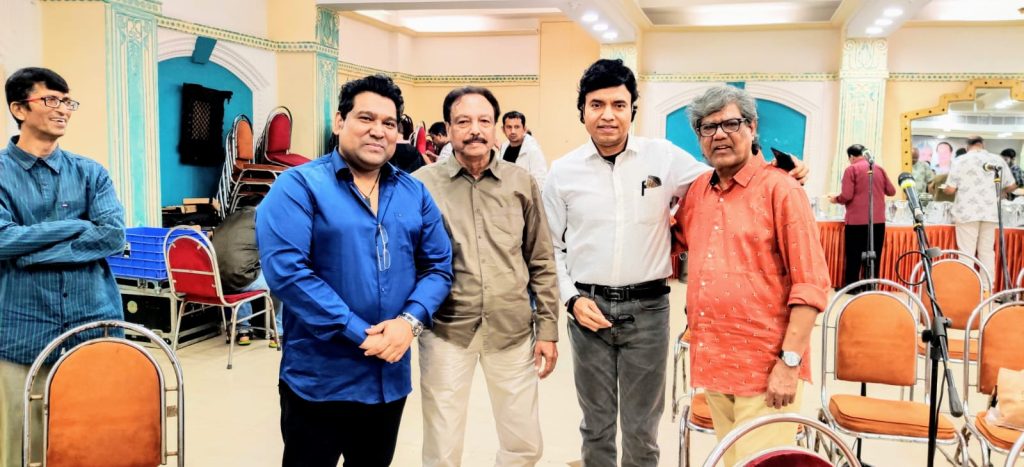 Lata was Indian film industry’s biggest asset. She was simple yet a great singer. In initial days she was rejected by composer Husnlal Bhagatram saying she has thinner tonal quality. Lata used to tie Rakhi to Dilip Kumar. He told her that in her Hindi singing, marathi diction surfaces. She immediately took Urdu lessons and later she never had a problem in singing in any language. When Mughal-E-Azam was in the making, it was decided to use classical singer Bade Ghulam Ali’s voice for Tansen’s character. He commented, ‘Lata Mangeshkar is never out of tune, never ever.’ The passion of film and music making those days was tremendous. I gather that the famous song ‘Pyar Kiya To Darna Kya’ from ‘Mughal-E-Azam’ was accepted by Mehboob Khan after rejecting 300+ songs.
Lata was Indian film industry’s biggest asset. She was simple yet a great singer. In initial days she was rejected by composer Husnlal Bhagatram saying she has thinner tonal quality. Lata used to tie Rakhi to Dilip Kumar. He told her that in her Hindi singing, marathi diction surfaces. She immediately took Urdu lessons and later she never had a problem in singing in any language. When Mughal-E-Azam was in the making, it was decided to use classical singer Bade Ghulam Ali’s voice for Tansen’s character. He commented, ‘Lata Mangeshkar is never out of tune, never ever.’ The passion of film and music making those days was tremendous. I gather that the famous song ‘Pyar Kiya To Darna Kya’ from ‘Mughal-E-Azam’ was accepted by Mehboob Khan after rejecting 300+ songs.
I have given sweat and blood to music. In fact my family, especially children, used to complain that they don’t find me in the house. I used to leave house by 9 and used to return not before 9. The children used to be sleeping when I returned home. But they are fabulous kids. Both my children, a son and a daughter, take care of me with love and I am overwhelmed because of their affection. I have witnessed so many children deserting their parents because they are old. That is very sad. I always thank Allah to have given me these two gems. Both are married and have kids. My son is an IT professional and daughter is a banker. They have told me to take up lesser work now given my advanced age.
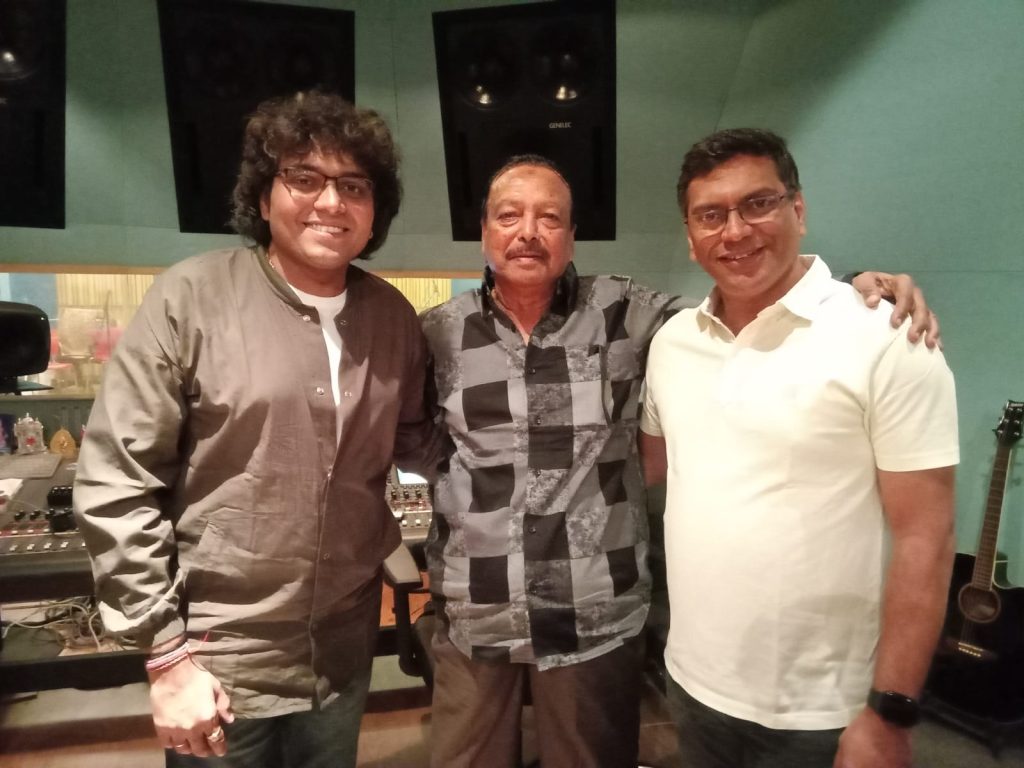 About children carrying father’s legacy forward. I think it’s not compulsory for any child to stride into the footsteps of their parents. And it is so very important with the artist’s children. Any art is inborn and it can not be learnt. One must have a flair for something which could be honed later. Laxmikant Pyarelal’s children couldn’t pursue their father’s legacy, Naushad’s children are not musicians and same goes for Madan Mohan. Don’t you think that these great musicians could have taught music to their offsprings? But music has to be within you. For that matter a lot of enquiries come to me to teach Banjo to youngsters. I gather information about them regarding whether they are able to play it, are they prepared for the hard work, how much time they’ll allot for ‘Riyaz’ and how passionate are they about playing the instrument. I have trained quite a few students and many have taken away my Banjo saying, “Guruji, your fingers have touched this instrument, so it’ll be lucky for us”. Frankly becoming an artist is the most difficult job. For other professions you can study and excel in it but not in music. You ought to have it within you.
About children carrying father’s legacy forward. I think it’s not compulsory for any child to stride into the footsteps of their parents. And it is so very important with the artist’s children. Any art is inborn and it can not be learnt. One must have a flair for something which could be honed later. Laxmikant Pyarelal’s children couldn’t pursue their father’s legacy, Naushad’s children are not musicians and same goes for Madan Mohan. Don’t you think that these great musicians could have taught music to their offsprings? But music has to be within you. For that matter a lot of enquiries come to me to teach Banjo to youngsters. I gather information about them regarding whether they are able to play it, are they prepared for the hard work, how much time they’ll allot for ‘Riyaz’ and how passionate are they about playing the instrument. I have trained quite a few students and many have taken away my Banjo saying, “Guruji, your fingers have touched this instrument, so it’ll be lucky for us”. Frankly becoming an artist is the most difficult job. For other professions you can study and excel in it but not in music. You ought to have it within you.
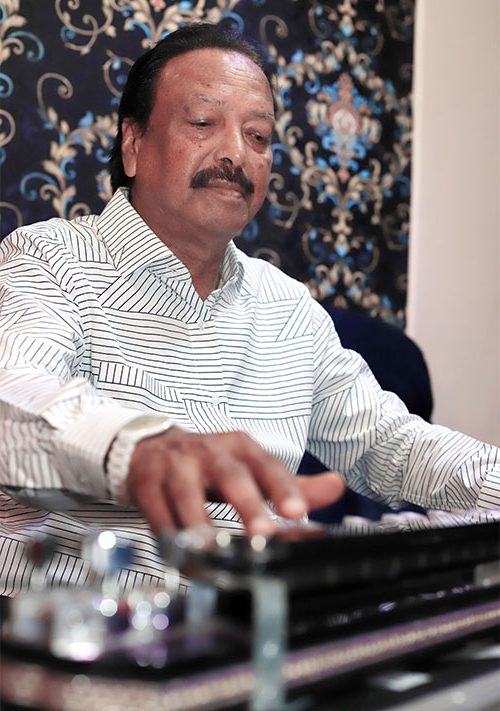 That reminds me that I used to give Banjo support to Altaf Raja. He recorded a song ‘Tum To Thehre Pardesi’ and my Banjo pieces were appreciated by everybody. It was a superhit song and helped me to elevate my status as a musician. In the music industry and also in the filmdom, people gauge talent with popularity. In earlier times the craft was respected but now money is the yardstick of success.
That reminds me that I used to give Banjo support to Altaf Raja. He recorded a song ‘Tum To Thehre Pardesi’ and my Banjo pieces were appreciated by everybody. It was a superhit song and helped me to elevate my status as a musician. In the music industry and also in the filmdom, people gauge talent with popularity. In earlier times the craft was respected but now money is the yardstick of success.
There was film titled ‘Banjo’……
Yes. It was inspired by me. I made Banjo popular but credit hasn’t been given where it’s due. I am saddened because I couldn’t go to The Kapil Sharma Show as I was seriously ill and bedridden.
India’s ‘Banjo Man’ Rashid Khan doesn’t have any regrets in life and he spends his time in praying and rehearsing on Banjo every single day. That is called dedication.


